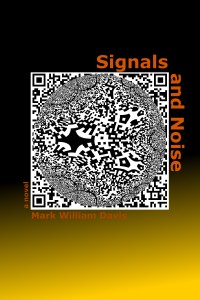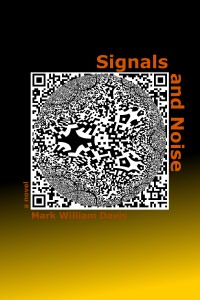Most interesting menu thusfar…beats French Laundry and Chez Panisse. Best of all, not being able to read the menu heightened the drama. Special thanks to my hosts on the eve of their tragic anniversary.
Month: March 2012
Signals and Noise: Chapter 13 (Cygnus atratus)
 Sometimes, when Zach had too much coffee, when he had sneaked a smoke on the back porch that projects out over the weedy ground and right up to the back wall, beyond which is the alley and driveway of an apartment complex in drab rose and orange, sometimes he would lie awake until there was a subtle shift in his sensibilities that was almost like a buzz encompassing him, and he would go on thinking about the events of the day even as he drifted off to sleep and then awoke again, minutes later, and was still thinking about them, like an unbroken chain of reasoning that suffered a momentary dip. But there was always a specter hanging in the facts and the faces and the ideas, like an irrational interloper. Only a fever ever reproduced anything like those moments—like that specter—only a fever could twist ideas over themselves into the impossible and weird motifs that were a merger of sleep and waking fantasies. Zach would rouse in those moments or sometimes bolt upright while trying to reclaim the ideas and force them into a coherent whole, but then, when the pieces had regained their permanence and the puzzle was reunited and showed, once again, the rational and calm artwork on the box of everyday reality, Zach would find himself longing for that alternative state, for the confusion that he struggled to subdue in the hypnagogic fog. It was not just curiosity, he realized, but a sense that there was a constructive event surfacing out of his unconscious self—an event that was using his memories for some special purpose.
Sometimes, when Zach had too much coffee, when he had sneaked a smoke on the back porch that projects out over the weedy ground and right up to the back wall, beyond which is the alley and driveway of an apartment complex in drab rose and orange, sometimes he would lie awake until there was a subtle shift in his sensibilities that was almost like a buzz encompassing him, and he would go on thinking about the events of the day even as he drifted off to sleep and then awoke again, minutes later, and was still thinking about them, like an unbroken chain of reasoning that suffered a momentary dip. But there was always a specter hanging in the facts and the faces and the ideas, like an irrational interloper. Only a fever ever reproduced anything like those moments—like that specter—only a fever could twist ideas over themselves into the impossible and weird motifs that were a merger of sleep and waking fantasies. Zach would rouse in those moments or sometimes bolt upright while trying to reclaim the ideas and force them into a coherent whole, but then, when the pieces had regained their permanence and the puzzle was reunited and showed, once again, the rational and calm artwork on the box of everyday reality, Zach would find himself longing for that alternative state, for the confusion that he struggled to subdue in the hypnagogic fog. It was not just curiosity, he realized, but a sense that there was a constructive event surfacing out of his unconscious self—an event that was using his memories for some special purpose.
There was an ameliorative effect to the anxieties of the day that crept in at those moments, like a sieve had strained all the complexity out of the bursts of nervous arousal, and he would lean back again into the hollow of his down pillow that smelled like his hair, tinged by his shampoo, and turn his face into the dome, sliding his cheek against the silky weave of the pillowcase, finally thinking that sleep would arrive soon.… Read the rest
Signals and Noise: Chapter 9 (Trance: beginnings)
 States of consciousness satisfy wildly different conceptions with equanimity. Here we have epiphenomenalism, where the feeling, the self, the I, are all freeloaders on some deeper commingling of logical prescriptions and mathematical calculations. We can stop right here, though, and track about in the cathedral of those subjective essences, reveling in each distorted recollection and episodic fumbling, worried that we are deflating the heart of the matter, the emotional character, draining out the seed that is essentially who we are. With time hanging like this—stopped, frozen—the propositions and their statistical basis functors start to rise into clarity, and the ripples of their influence trickle into sensibility. I did in fact do that, say that, because it did in fact make sense. I am aware of that now and the blip of clarity, momentary as it was, reflects that underlying matrix of contending feelings, driving hopes, and social posturing.
States of consciousness satisfy wildly different conceptions with equanimity. Here we have epiphenomenalism, where the feeling, the self, the I, are all freeloaders on some deeper commingling of logical prescriptions and mathematical calculations. We can stop right here, though, and track about in the cathedral of those subjective essences, reveling in each distorted recollection and episodic fumbling, worried that we are deflating the heart of the matter, the emotional character, draining out the seed that is essentially who we are. With time hanging like this—stopped, frozen—the propositions and their statistical basis functors start to rise into clarity, and the ripples of their influence trickle into sensibility. I did in fact do that, say that, because it did in fact make sense. I am aware of that now and the blip of clarity, momentary as it was, reflects that underlying matrix of contending feelings, driving hopes, and social posturing.
But here we have dualism, reflecting every folk psychological wire in our hypothetical soul. We are distinct and apart from our bodies, like parasites hitching a ride, implanted by some god or first principle back behind our brow ridge. Oh, yes, we are subjects of the body and brain, but we are also their master. We command, they obey, at least until they buck and collapse under duress, laziness, and pain. The signals come back in and there is not enough will, despite our separation behind the bunkered walls of gauges. There is not enough will, somehow, to push a bit further, because we are in fact the fatigue, the pain, the boredom. We realize this at those passing moments when we are at the limit and the structures seem too porous for there to be any reason to the proposition.… Read the rest
Tokyo (Shin-Yokohama) and the Art of Noticing
Rooftop gardens, construction workers doing calisthenics before starting their labors, and a multi-tiered cemetery and temple are pierced by a Shinkansen (bullet train) in this panorama via iPhone (Limit Point Software panorama app) and Gimp.… Read the rest
Magical Blood Typing
Since I’m in Japan, it’s raining and I slept too much on the plane to get back to sleep, I thought I’d post on the Japanese blood type craze. Full disclosure, as AB+ I can be arty and mysterious.
I’m reminded of the suggestion that UFOs are demons that permeates some of more extreme fundamentalist community. In the case of the Japanese interest, it likely started from origins in “scientific racism” that permeated pre-WWII Japan and Germany. Quoting Mussolini, “The best blood will at some time get into a fool or a mosquito,” I have to wonder how the Axis powers managed their racial antipathy towards one another enough to remain part of the Axis?… Read the rest
AntiTerran Metatextuality
 Intertextuality is a loaded word. It covers allusion and parody and reference. For some authors, it is the motivation to write, from Umberto Eco’s semiotic indulgences to Nabokov’s vast, layered palimpsest in Ada. I create deliberate allusions to Genesis in Teleology and references to Nabokov’s Ada in Signals and Noise.
Intertextuality is a loaded word. It covers allusion and parody and reference. For some authors, it is the motivation to write, from Umberto Eco’s semiotic indulgences to Nabokov’s vast, layered palimpsest in Ada. I create deliberate allusions to Genesis in Teleology and references to Nabokov’s Ada in Signals and Noise.
The opposite of intertextuality might be centrality or concreteness, but it might also be the extension of the literature or artwork as references in other works that extend or reimagine the original work, creating a literary chain of sorts. Your intertextual references are referenced by my metatextual extensions. Outertextuality? Whatever the term, we get a kind of referential landscape like a network that builds on an artificial landscape, the lives of imagined characters, and the universe of ideas that they inhabit.
Dieter Zimmer, who appears to have done the German translation of Ada, has a brilliant example of metatextuality in his Geography of AntiTerra. With methodical precision, he translates the textual descriptions into a map of the imagined world–a kind of fan cartography that solidifies the strange geography into a complete realization. I’m reminded of the Elven dictionaries in The Silmarillion or the detailed online fan fiction from adoring readers of current bestsellers.
I think there is likely a strong connection between the psychology of religious belief and the same motivators towards metatextuality. Imagined worlds are always interesting and plotted. Even when characters are harmed or injured, we feel only fleeting sensitivity to the idea of their injury. Moreover, the intertextuality is a network of coherence-supplying support for the narrative’s epistemology. The more detail, the greater sense of clarity of the imagined world, and the more buy in as to the reality of mysteries described therein.… Read the rest
